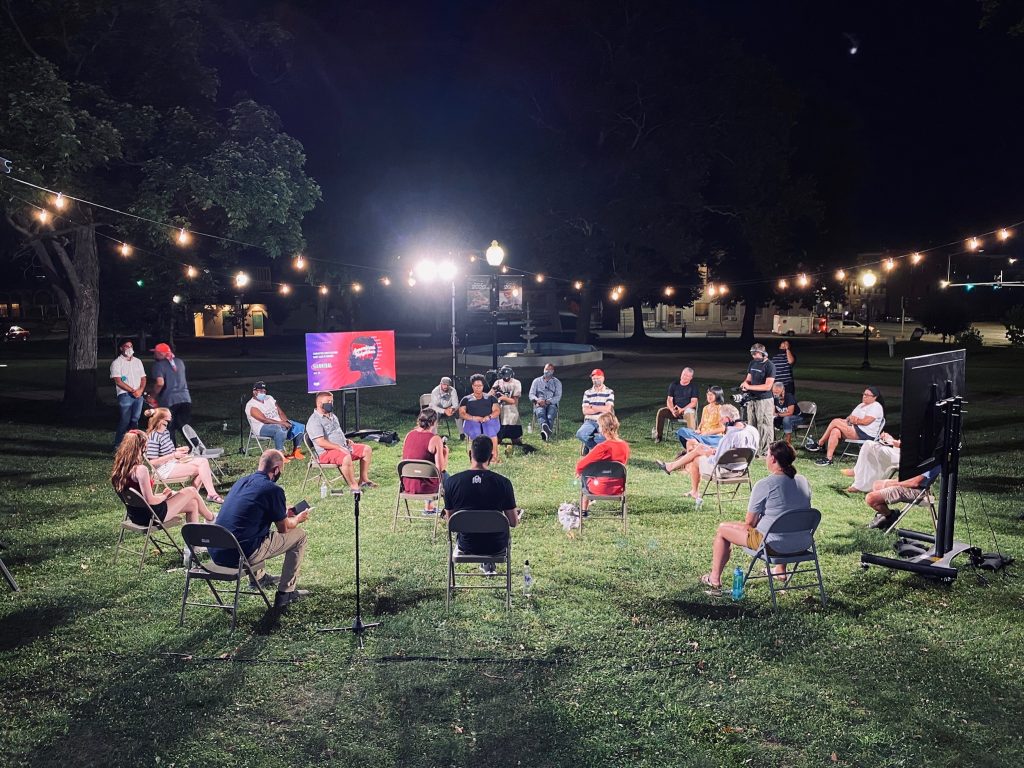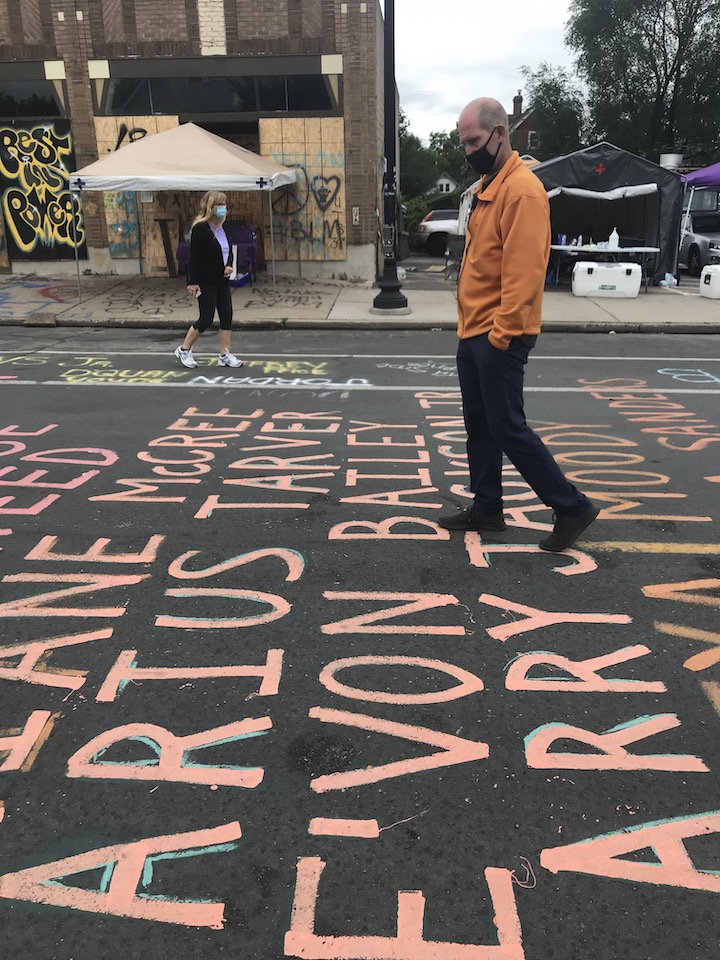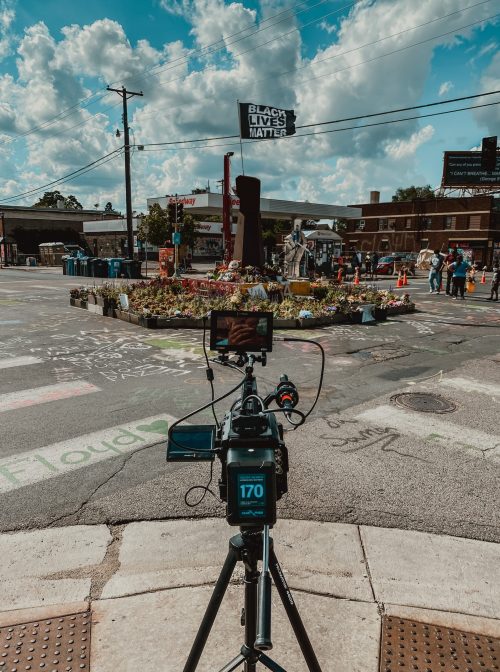In July 2020, I was standing in front of the Lorraine Motel in Memphis, Tennessee, the place of Martin Luther King Jr.’s assassination. I was in the middle of a 12-day journey down the Mississippi to host public conversations on race.
I think about that day often, especially today, for two reasons – we are making public all five films from that journey for the Interfaith America community and beyond. The film series, called American Neighbor, was created with a diverse team as a part of The Nantucket Project.
That journey led us down the Great River Road, from Minneapolis to New Orleans. Each night, in a different city or town, we gathered with local community members for an outdoor, public conversation about race. And, it changed us. Today, April 4, is also the 55th Anniversary of Rev. Dr. Martin Luther King’s assassination.

The day usually goes by unmarked. Instead, most people remember Dr. King in January on the holiday that marks his birthday. But the significance of the April date has always struck me more than the January one.
Years ago when I lived in South Carolina and the Confederate flag still flew on the State House there, the January date seemed significant because in SC that day was one of two dates that students could choose from to take a day off from school—the other was on Confederate Memorial Day. The result was a Black holiday and a white Holiday. Far from Dr. King’s dream.
As a young labor activist, the story of Dr. King’s death drew me to Memphis, in part, because he was in Tennessee to show his solidarity with striking sanitation workers. It was the ultimate labor-community or civil rights coalition and the campaign slogan, “I am a man” spoke volumes about this disrespected, endangered and often invisible workforce. A workforce of all Black men demanding dignity, fair wages and the right to a voice in their work was the manifestation of the inextricable link between labor and civil rights struggles. This resonated with me profoundly.
But over the years, it is the assassination date that has captured my attention. It is probably the Promised Land speech he gave the day before his murder, while standing on the balcony of the Lorraine Motel, that continues to have such a grip on me.
Dr. King preached,
“Longevity has its place. But I’m not concerned about that now. I just want to do God’s will. And He’s allowed me to go up to the mountain. And I’ve looked over. And I’ve seen the promised land. I may not get there with you. But I want you to know tonight that we, as a people, will get to the promised land. And I’m happy tonight. I’m not worried about anything. I’m not fearing any man. Mine eyes have seen the glory of the coming of the Lord.”
I have often wondered, was it a premonition? There had been threats in his life. Did he know what was coming? Was he reckoning with his own mortality? Or maybe it was the season? With the coming of April, we get Pesach and Easter. Two holidays deeply interconnected in theology. Pesach is the story of the liberation of the Jews from enslavement in Egypt. It is also the story of Moses leading the people out of bondage, but his life ending before he reached the promised land. Maybe as Dr. King planned to be in NYC for a Passover Seder after Montgomery, this story was on his mind.

As a young activist exploring my own Jewish identity, I found myself mesmerized, as well as speechless, as I listened to these words in his last speech. Dr. King knew my tradition? Our Passover story mattered to him? That whole promised land notion isn’t just ancient theology but foundational social change iconography? Wow, I better dig into my tradition, I thought, all those years ago, if I am going to bring my most authentic, dedicated self to the labor and civil rights work, the crossing lines of difference work, that would animate the next decades of my career.
And it has. I have listened to every speech Dr. King has given that I can get my hands on. I have worked and reworked the Exodus narrative as the framing for my work and as a context for my family’s story of resilience, and I have continued to look for those organic crossover moments where movements blur and new possibilities become available.
The labor and civil rights struggles have grown and evolved, waxed and waned—as has their collaboration since I first listened to the Promised Land speech 30 years ago. The heyday of the Black-Jewish partnership is a distant memory and that always fraught alliance has found itself somewhere between precarious and in tatters.
And yet we march on toward the promised land.
As part of this march, in July 2020, I joined a terrific team on the American Neighbor journey. We were in the most tragic months of the pandemic and the most tense days following the murder of George Floyd at the hands of Minneapolis police officers. We drove from Minneapolis to New Orleans, covering nearly 10,000 miles. Each night, in a city like Hannibal, MO or Vicksburg, MS we facilitated outdoor, open conversations about race. We captured all of that on film and turned them into a 5-part documentary series with discussion guides, journals from the road and unseen footage of the conversations that have developed since the trip and the relationships we built.
We hope you will watch the films. We invite you to use the materials along with the films to convene conversations. Fifty-five years after his death we are still painfully far from his vision of an America where “children are judged by the content of their character and not the color of their skin,” yet his vision, courage, and faith can still inspire us to do the work every day. Dr. King taught us that “Darkness cannot drive out darkness, only light can do that. Hate cannot drive out hate. Only love can do that.” May these films and the conversations they provoke bring a little more love and light to our communities and our country.




